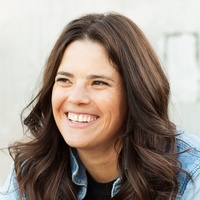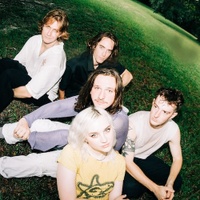On knowing when something isn't done
Prelude
Sophie Allison, better known by her stage name Soccer Mommy, is an American singer-songwriter from Nashville, Tennessee.
Conversation
On knowing when something isn't done
Singer-songwriter Soccer Mommy on being a distracted person, taking inspiration from place, and avoiding the pitfalls of categorization.
As told to Jess Focht, 1186 words.
Tags: Music, Process, Creative anxiety, Multi-tasking.
I read that Avril Lavigne’s Under My Skin was the first album you ever owned. I found that so relatable because it was the first album I remember making my dad buy me at the record store. I love that she was a role model for our generation, and now many women are getting the visibility they deserve in the rock sphere. What about Avril inspired you as a young person?
She was such a big artist when I was a kid. I was 6 or 7 around that time and already in love with music. I think she had an attitude and energy that felt different—edgier. There was that pop-punk influence, but it was mixed with something more introspective, almost like Elliott Smith. She had a unique sound that spoke to a lot of people. It was a little emo, a little angsty, and that resonated with me. Her energy felt different from a lot of what was being marketed to young girls at the time.
At what age did you start writing songs? Looking back, is there something you wish you had known before you started making music—something you wish someone had told you?
I started writing music when I was 5 or 6. I was always writing songs just because I loved it—it was something I was naturally driven to do. Honestly, there’s nothing I wish someone had told me before I started writing music. In terms of songwriting itself, I still approach it the same way I always have. But, of course, doing it as a career is very different. There’s a lot involved that has nothing to do with music or the craft, things you don’t realize when you’re first starting out. When you begin a career path, you don’t anticipate that the creative part will shrink and become only one aspect of what you do. So, I guess that’s the only thing I wish I had been more prepared for.
How has your creative process changed over the years, from your first album Color Theory to your most recent al Evergreen, how has it evolved?
The writing process itself hasn’t changed. The evolution is more in the writing itself. I’ve grown older, my mindset has expanded, and I have more ideas and a different outlook on life. But the process is still the same: me sitting down with my guitar, writing, and seeing what comes out. I don’t do co-writing or anything like that.
Even my writing space hasn’t changed. I’m usually sitting on my bed or couch, playing guitar, the way I always have. What has changed is the process of making a record. I have more opportunities to go into a studio, experiment with production, and think about the sound on a broader scale. I take that part seriously. I want each album to have a cohesive sound and distinct ideas. That’s where I see the biggest shift.
Have you found it harder to limit distractions as your career has grown? I know that, for many musicians, touring is all-consuming, and songwriting becomes a separate, private process. In a world with increasing distractions, has it become more difficult to focus on songwriting?
I’m naturally a very distracted person. But when I’m focused on writing, I’m all in. So I don’t struggle to get the writing done when I’m inspired. I don’t write as much on tour because the schedule is grueling. But if I’m excited about an idea, I’ll find time. If I’m not feeling inspired, I don’t force it. But usually, I have enough moments of inspiration to write a full album within the expected timeframe.
Do you do anything outside of music that inspires your songwriting process?
I think I just overanalyze everything. I spend a lot of time thinking, which naturally feeds into songwriting. By the time I sit down to write, I’ve already processed a lot of thoughts and ideas. Occasionally, something I’ve read will inspire a visual element, but usually, inspiration just comes from playing guitar and exploring chord progressions.
When you write songs, do you usually start with lyrics or melody? Or does it vary?
It’s a mix. Lyrics and melody usually come together because they’re so intertwined. Cadence plays a big role in making something feel right; the melody that emerges from certain words can shape the whole song. But sometimes, I’ll have a specific lyric or chorus idea and build from there.
I love your cover of Wide Open Spaces by The Chicks. I’m from Tennessee too, so I really related to that song choice… Does living in Tennessee influence your creative process?
Definitely. Living in different places changes what I draw from as metaphor and imagery. When I lived in New York, I used the city to describe emotions and moments. Now, having easy access to nature and a more relaxed lifestyle brings me peace, which influences my writing. Location can really shape the lyrical and emotional tone of a song.
I read that you often associate your songs with colors. How does that shape your creative process?
I don’t actually see colors when I write, but I think about them a lot when making an album, especially for the visuals and artwork. Colors and saturation levels have different emotional tones, and since I include a lot of visual imagery in my lyrics, those associations naturally come through.
How do you know when a song is finished?
I think I know when it’s not done more than when it is. Technically, a song is finished when the structure is complete and the lyrics are set. But sometimes, I’ll keep tweaking lyrics, trying to make them better. Eventually, you just stop getting new ideas and realize you’re happy with what you have.
How do you feel about the term “sad girl” as a genre? Some artists embrace it, while others push back against being categorized that way.
There are positives and negatives. It has brought attention to great music, but categorization can be limiting—especially for women. It defines artists by gender rather than just their work. It can also make it harder for those who don’t fit the current trend to break through. While it has given visibility to confessional, emotional songwriting, it can also box artists into a narrow space.
Soccer Mommy recommends:
The Fabulous Beasts by Joyce Carol Oates. This is a book of poems I was reading recently. There are a few that I really connected with.
Nickel Boys dir. RaMell Ross. I saw this at my local theater recently and was really blown away. It’s really well done and very moving.
Sleepwalker by Long Beard. I always return to this record! It’s so beautiful and great for night time listening.
“Ohio All The Time” by Momma. I love this Momma single so much! I cannot stop listening.
Dyer Observatory. This is the observatory in Nashville. I love going to their telescope nights. Looking at stars is one of my favorite things to do.
- Name
- Soccer Mommy
- Vocation
- singer-songwriter
Some Things
Pagination



